
FEOH (fee)
The word feoh originally meant 'cattle'. In the days before coins came into use, cattle were often bartered for other goods. Because of this, feoh became a byword for 'payment', hence the modern word 'fee'.
This rune was replaced by the Roman letter F. In most positions, it was pronounced as a modern F, as in fether 'feather' or lyft 'lift'. Between vowels, however, it had the sound of a modern V, as in seofon 'seven'. The letter V was not used in Old English and did not become widespread until later in the Middle Ages. This rune is usually taken to mean wealth, worldly goods and the sharing of these.
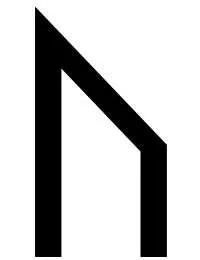
UR (aurochs)
The aurochs was a wild, longhorned ox renowned for its great strength and short fuse. It became extinct in Britain well before the first English settlers arrived, which suggests the rune was given its name while the English were still living in their continental homeland.
This rune was replaced by the Roman letter U. In Old English, as in Modern English, vowels had both a long and a short sound. The short U in Old English was the sound we now have in the word 'pull'. The long U was more akin to the sound we hear in 'owl'. Examples include tun 'town', ful 'foul' and mus 'mouse'. Commonly cited meanings for this rune include brute strength, boldness and fearlessness.

THORN (thorn)
While this rune is known as thorn in the Old English Rune Poem, it bears the name thurs in the other two poems. This is the same thurse which appears in the Blood of Woden books: a wild, savage and, thankfully, mythical monster.
Thorn made the sound TH, as in þeof 'thief' and þær 'there'. The Roman alphabet had no letter for this sound, so English speakers continued to use a rounded version of the rune alongside the new Roman letters. From the twelfth century onwards, the rune was dropped in favour of the TH we use today. Thorn is usually taken as a warning not to grapple with what you do not know.

OS
Os is the singular form of Esa, the kindred of gods at the heart of the heathen Germanic faith. The word went out of use years ago, although it does survive in names such as Oswald and Osborne. The Old English Rune Poem describes it as a speech rune.
This rune was replaced by the Roman letter O. Like all English vowels, it had a long and a short sound. The short sound occurs in bodig 'body', while the long O gives both boc 'book' and brod 'brood'. As per the Poem, this rune is usually taken to rule speech and wisdom. Some also take it as a reference to Woden, the god most associated with these traits.
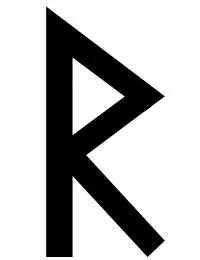
RAD (road)
The name of this rune is the old form of the word 'road'. Nowadays, this word tends to mean 'street', but back then it meant 'journey'. This meaning lives on in phrases such as 'the road to recovery' or 'one for the road'. Long overland journeys would have been made by horse in those days so it should come as no surprise that 'road' shares a root with 'ride'.
This rune was replaced by the Roman letter R. It was pronounced the same in Old English as it is today, for example riht 'right', træppe 'trap' and word 'word'. Rad represents both the road through life and any actual journeys made along the way.

CEN
Cen had the meaning of 'torch' or 'firebrand' in runic times. This word did not make it into Modern English. In line with the explanation below, the rune would have been pronounced 'chen'. Common meanings include fire, fever and illness.
This rune was replaced by the Roman letter C. Before A, O, U, Y and all consonants it was hard, for example cald 'cold', cynn 'kin' and cræft 'craft'. Before I or E it was usually soft, the soft sound being like modern CH, for example ceap 'cheap' and cild 'child'. (There were several exceptions, such as cene 'keen'). At the end of a word it could be either hard or soft, as in blæc 'black' and benc 'bench'.

GYFU (gift)
In Old English, Gyfu meant both 'gift' and the act of giving. Giving and receiving were important in heathen society: wealth was to be shared and gifts were to be gratefully received. The Poem uses Feoh to promote sharing and Gyfu to encourage gratefulness.
This rune was replaced by the Roman letter G. In Old English, G had three distinct sounds. Before A, O, U, Y and all consonants it was hard, as in gold 'gold' and glæs 'glass'. Before I or E, and at the end of a word, it was usually pronounced as a modern Y, as in geard 'yard' and hunig 'honey'. Between vowels, it made a kind of soft W, for example fugol 'fowl'. The sound we now get from D and G was made in Old English by C and G, for example ecg 'edge'. This rune is generally taken to stand for giving and receiving.

WYNN (win)
Wynn originally meant 'bliss' or 'joy'. In this sense, it lives on in the Modern English word 'winsome'. Although the verb 'win' does not come directly from wynn, the two words share the same root, which makes sense in terms of their meanings.
Like Thorn, this rune continued to be used after the switch to the Roman alphabet, as it stood for a sound which did not exist in Medieval Latin. By the twelfth century, it had been replaced by UU, which evolved into the W we have today. It had the same sound as in Modern English: werig 'weary', swift 'swift'. The meaning is usually given as carefree and unbridled joy, making it the most positive of all runes.

HÆGL (hail)
Hægl refers to the small lumps of ice rather than the greeting. The word was pronounced as in Modern English. All three rune poems describe hail as being like corn. This is a pretty specific way to describe it and suggests the three poems share a common source.
This rune was replaced by the Roman letter H. It was pronounced the same as in Modern English, for example heall 'hall' and hungrig 'hungry'. Unlike today, H was often used and pronounced before consonants in Old English, as in hwæt 'what', hlæder 'ladder' or hring 'ring'. Common interpretations of this rune include weathering the storm and overcoming hardship.
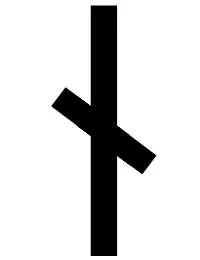
NYD (need)
The name of this rune is sometimes written Nied as this was the standard Old English spelling of 'need'. In runic times, the meaning of Nyd was skewed more towards hardship and suffering than it is today.
This rune was replaced by the Roman letter N. It was pronounced the same way as in Modern English, for example standan 'stand' and nearo 'narrow'. Note, however, that it was never used in the combination NG. This had its own rune (see Ing). The rune is commonly said to mean hardship, need and sorrow, but with the upbeat promise that none of these cannot be overcome.

IS (ice)
The name of this rune means 'ice' (not 'is'). The properties ascribed to it include obvious traits such as cold and slipperyness, but also risk and trickery.
This rune was replaced by the Roman letter I (although telling the difference would be hard). As with other vowels, it had a long and a short sound. The short sound was used in words such as fisc 'fish'. The long vowel is found in tigel 'tile' and writan 'write'. A third sound occurred when used before G at the end of a word, as in numbers such as twentig 'twenty' or adjectives such as dreorig 'dreary'.

GER (year)
This word meant the same in Old English as it does today. It could also refer specifically to harvest-time, which is the subject of its verse in the Old English Rune Poem. The stave shown is the one from the Poem, but this was only used towards the end of the runic period. Until then, Ger took the shape of the Ior rune, which was not yet a separate sound.
Ger was used sparingly in Old English, as it reproduced the soft G of Gyfu. In Modern English, we use the letter Y to represent this sound, as in 'yield'. In other Germanic tongues, however, the rune was replaced by J, as in German jahr 'year'. J did not appear in English until later in the Middle Ages. A meaning of harvest, fruitfulness and thanksgiving is usually ascribed to this rune.

EOH (yew)
The more common Old English spelling of 'yew' was iw, so the name of the rune may preserve an older form. To the heathen English, the yew stood for long life and stability. The rune is thus taken to represent both the hardness of the tree and its role as a marker of time.
Eoh had no counterpart in the Roman alphabet. Soundwise, therefore, it is something of a mystery. Like Ger, this rune was seldom used in Old English, so examples are few. Where it was used, most notably on the Ruthwell Cross, it often appeared where we would now have GH, as in ealmihtig 'almighty'. In Old English, GH was written simply as H, examples being niht 'night' and toh 'tough'.

PEORTH
The word peorth is known only from the Old English Rune Poem, so allotting a meaning is hard. There is nothing to suggest it was not a meaningful word, but other examples are yet to be found. Whatever the name means, the Poem describes Peorth in terms of play and laughter in the beerhall, so it was clearly positive. Drinking, games and sex have all been suggested.
The only thing we can say with certainty about this rune is that it was replaced by the Roman letter P. It was pronounced the same in Old English as in Modern English, examples being pæth 'path' and æppel 'apple'. The letter P was uncommon in Old English words.

EOLH SECG (elk sedge)
This rune is unique in that its sound comes in the middle of the name. Sedge is a wetland grass which grows all over Europe, while an elk is a large deer found in Scandinavia. There is no European sedge called elk sedge so the plant must now go by some other name.
It is believed this rune originally stood for the sound we now know as Z. However, by the time Old English was being spoken, its sound had shifted to that of modern X. This was a rare sound in Old English and examples of the rune are likewise rare. It was replaced by the Roman letters CS or X, for example æcs 'axe' or fox 'fox'. Typically, this rune is described as one of protection and warding off harm.
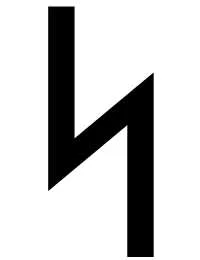
SIGEL (sail)
Aside from the Rune Poem, the word sigel is known only from sigelhweorf - the name of a flower. Some sources claim it was an ancient word for 'sun'; others claim it comes from segl, the old form of 'sail'. The Poem describes it simply as something helpful to sailors.
This rune was replaced by the Roman letter S. Most of the time, it made the sound we now get in 'horse', for example fæst 'fast'. Between vowels, however, it was generally pronounced as in 'choose', for example risan 'rise'. When followed by C, it was pronounced as SH in 'short', for example scip 'ship' and wascan 'wash'. The meaning of the rune is generally given as hope, guidance and reassurance.

TIR (tiw)
Tir is an alteration of Tiw, the warrior god who appears in the Blood of Woden books. The name of this god varies widely, being recorded as Tig in some English place names and as Tyr in Old Norse. The word may also be used as a noun to mean 'victory' or 'glory'.
This rune was replaced by the Roman letter T, and was pronounced as it is today: tægel 'tail', metan 'meet'. Note, however, that Tir was never used to make the sound made by Thorn. When T and H appear side by side in Old English, they are always pronounced separately, as in Modern English 'hothouse'. Common meanings for this rune include victory, bravery and troth, as well as the god himself.

BEORC (birch)
This word meant the same in Old English as it does in Modern English, and was pronounced much the same way. It is one of four English runes named after a tree.
This rune was replaced by the Roman letter B. It was pronounced as it is in Modern English, for example bosm 'bosom' or brecan 'break'. The Old English Rune Poem describes the tree nicely but offers little deeper meaning. The consensus seems to be that the rune stands for spring, growth and youthfulness. If this is the case, it may well have been linked to the goddess, Eoster.

EH
This was one of several words in Old English that had to do with horses. A few have made it into Modern English - hors being the obvious one and mearh 'mare' being another. Eh was one of those that did not, although it does share an ancient root with the Latin word equus, and thus the Modern English word 'equestrian'.
This rune was replaced by the Roman letter E. The short E was pronounced as it is today, for example ende 'end'. The long E could be pronounced either as in 'feet' or in 'name', for example secan 'seek' or thegn 'thane'. Note that this rune only represented E on its own: the pairings EA and EO had their own runes (see Ear and Ethel). Eh stands for the freedom and movement offered by a horse.

MAN (man)
In Old English, the word mann meant simply 'human being'; it did not mean 'male human' as it does today. This meaning lives on in words like 'mankind' and in sayings such as 'all things to all men'. In Old English, a male man was a wermann and a female was a wifmann. The word wer does still exist but only as the first part of 'werewolf'. Wif is, of course, Modern English 'wife'.
This rune was replaced by the Roman letter M. It was pronounced the same as it is today, for example monath 'month' and dom 'doom'. The meaning is based upon a rather gloomy verse in the Rune Poem, which stresses the weakness and mortality of mankind.

LAGU
The word lagu had two meanings in Old English: when spoken with a soft G it meant 'law' and when spoken with a hard G it meant 'sea'. It is clear from the wording of the Poem that the second meaning is intended. This word did not make it into Modern English, but it does share a root with the Latin word lacus, from which we get 'lake' and 'lagoon'.
This rune was replaced by the Roman letter L. It was pronounced the same as in Modern English, for example lang 'long' and wealdan 'wield'. Lagu is usually taken to stand for the breadth and depth of the sea, and mankind's powerlessness to tame it.
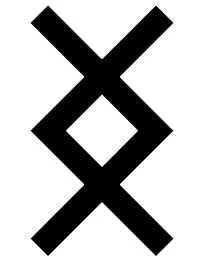
ING (ingui)
Ing is named directly after Ingui, the god at the heart of The Runemaster. Although this is the only time he is mentioned by name in Old English, he appears in several Old Norse poems as Ingui-Freyr. This rune is unique in that its sound comes at the end of the name.
Latin did not have this sound so the Roman alphabet had no letter for it. Old English used N and G to represent the sound, as we still do today. The rune was pronounced with a hard G, as in 'stronger'. Examples include thing 'thing' and finger 'finger'. Its meanings are given as sex, manhood, fertility and plenty, all of which were attributes of Ingui.

ETHEL
Ethel meant 'noble' in Old English. It forms the root of the word atheling, meaning 'prince', along with personal names such as Ethelred and Athelstan. The word is no longer used as an adjective, but it has given us the name 'Ethel'.
This rune was replaced by the Roman letters EO. This was a very common spelling in Old English - far more common than E on its own. Today, however, EO has all but vanished: heofon has become 'heaven', sweoster has become 'sister' and so forth. Soundwise, Ethel was pronounced much like the EO in 'leotard'. This rune is usually taken to stand for the home and the importance of belonging.

DÆG (day)
This word had the same meaning in Old English as in Modern English, and was pronounced the same way. The Rune Poem focuses on the benefits of daylight rather than the day as a unit of time.
This rune was replaced by the Roman letter D. It was pronounced as in Modern English. Examples include disc 'dish', fodor 'fodder' and wendan 'wend'. In most translations, Dæg stands for daylight and the feeling of safety and cheer that only daylight can bring.

AC (oak)
This word had the same meaning in Old English as in Modern English, and was pronounced much the same way. The Rune Poem deals with the qualities of the wood rather than the tree. As a result, Ac is generally taken to stand for proven strength and toughness.
This rune was replaced by the Roman letter A. As a general rule, the short A in Old English was pronounced like the U in modern 'sun'. There were, however, plenty of exceptions. Compare the modern sounds in faran 'fare', hand 'hand' and hrathor 'rather'. The long A was more consistent and is today written O or OA. Examples include ath 'oath', blawan 'blow' and stan 'stone'.

ÆSC (ash)
The name refers to the tree rather than to the leftovers of a fire. In this sense, it meant the same in Old English as in Modern English. The Poem describes a tree which holds its ground no matter what, giving a common interpretation of steadfastness and determination.
This rune was replaced by the Roman letter Æ. As Old English gave way to Middle English in the twelfth century, Æ was shortened to A (hitherto only used for words spelt with the Ac rune). The rune appears not to have had a fixed long and short sound. Instead, it made a broad range of sounds, as witnessed by the following: nægl 'nail', hærfest 'harvest', nædre 'adder', ænig 'any', rædan 'read'.

YR
The names of these last three runes are simply the sound of the rune plus 'r'. All three are vowels which developed in Old English after the migration to Britain. The meaning most often ascribed to Yr is the honour of being a bowman and the pride of being one of the elite.
This rune was replaced by the Roman letter Y. In Old English, Y was always a vowel, as it still is today in words such as 'fly'. The long and short sounds were little different, both being somewhere between the I in 'sing' and the EW in 'few'. Most words which used Yr are now spelt with I, for example lytel 'little', cyssan 'kiss' and hrycg 'ridge'.

IOR
Ior is believed to have split from Ger in the ninth century: Ior took the shape of the old rune while Ger kept the name. The Poem refers to some kind of water-dwelling creature. There is no consensus on the meaning, but wellbeing and adaptability are often suggested.
The Roman alphabet had no letter for this sound, so English speakers used I and O together. IO was never common in Old English and appears only in a few Northumbrian spellings. Liornung 'learning' and giornon 'yearn' show some of these Northumbrian forms. This sound no longer exists in English: words such as 'action' and 'fusion' come from French and represent a different sound.
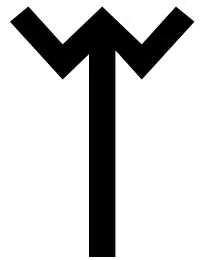
EAR
Like Yr and Ior, the name Ear is simply the sound of the rune plus 'r', and has nothing to do with the word 'ear'. Its verse in the Rune Poem describes a body decaying into the ground, from which a meaning of death and finality is widely accepted.
The Roman alphabet had no letter for this sound, so English speakers used E and A together. This was a very common spelling in Old English. Soundwise, the short sound of Ear seems to have stressed the A more than the E, as in ealdorman 'alderman', weard 'ward' and mearc 'march'. The long sound was the other way round, as in east 'east', death 'death' and beam 'beam'.




























